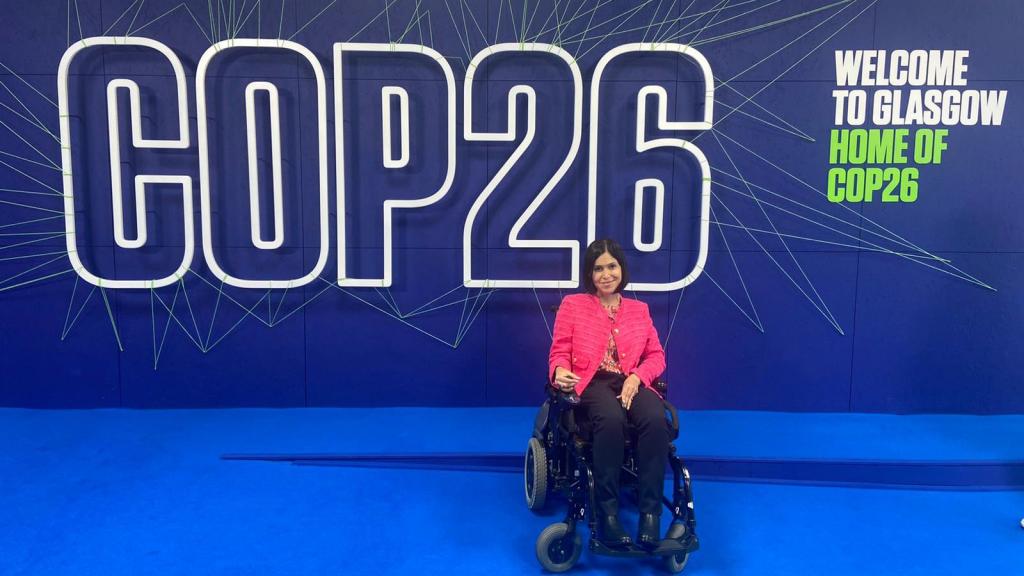

The only options to get to the venue were to walk or board a shuttle that was not wheelchair-friendly



The 26th Conference of Parties (CoP26) to the United Nations Framework Convention on Climate Change (UNFCCC) being held at Glasgow is one of the most important international events of current times.
We all are aware that this summit is organised to bring different countries together towards the goals of the Paris Agreement. Climate change is an all-encompassing crisis that is affecting us and COP26 is getting the media attention it deserves. Different groups are bringing out statements and conducting side-events at the summit.
However, one news which did not make it to most headlines is the reason why Israel’s energy minister, Karine Elharrar, could not attend the conference. It is natural to expect that a world event on this scale will be inclusive of all. It was shocking to learn that Elharrar could not reach the conference grounds because the only options to get there from the gathering area were to walk or board a shuttle that was not wheelchair-friendly.
Elharrar tweeted:
I came to CoP26 to meet my counterparts in the world and advance our joint struggle against the climate crisis. It's sad that the United Nations, which promotes accessibility for people with disabilities, in 2021 doesn't worry about accessibility at its own events.
The organisers apologised but the fact remains that one of the participants could not attend the conference because she is differently abled.
Apart from the initial shock, we need to think about how ableism engulfs us. Obviously, if it was a UN Conference on disability issues, such arrangements would have been there.
The fact that no one in this society, including the UN, thinks that a disabled person can attend an important meeting not related to disability became apparent. Here lies the importance of embracing universal design and thinking of disability as an inherent component of every single work that we participate in.
Prior to COP26, disability groups started working on their demands and expectations from the conference. International Disability Alliance (IDA) endorsed and launched the document drafted by Disability Inclusive Climate Action Research Program with help of disabled people's organisations (DPO). This document outlined why a disability-inclusive approach to climate change is needed.
Its introduction states:
Although persons with disabilities constitute 15 per cent of the world’s population, climate action, including at the multilateral level, has neglected to fully reflect their rights. While the preamble to the 2015 Paris Agreement includes persons with disabilities as one of the groups most acutely affected by climate change, they have been largely excluded from decision-making processes and outcomes under the UNFCCC, as well as from the United States’ climate change policies and plans at the domestic level.
The failure to include persons with disabilities in the world’s efforts to combat the climate crisis has dramatic consequences, the document stated. “Due to inaccessible disaster preparedness plans, systemic discrimination, and widespread poverty, people with disabilities are left behind in relief and response efforts.”
The document noted that UN Convention on the Rights of Persons with Disabilities (UNCRPD) specifically obliges its state parties to fulfil a broad range of human rights held by persons with disabilities:
The UNCRPD requires that state parties ensure the participation of persons with disabilities in the development and implementation of legislation and policies, the demand statement noted.
The UN convention also mandates participation of persons with disabilities in other decision-making processes concerning issues relating to persons with disabilities, as well as the protection and safety of persons with disabilities in situations of risk, including situations of humanitarian emergencies and natural disasters, according to the document.
Unfortunately, it is not only the CoP26 venue that remains inaccessible — reports after every natural disaster from different regions show that countries are not prepared to deal with persons with disabilities.
States hardly provide any accessible material or information on what to do during a natural calamity to the disabled population — one of the most vulnerable. Evacuation centres are not made keeping universal designs in mind. There are many instances of lack of toilet facilities for disabled people and heightened difficulties of women with disabilities.
Disability rights groups claim that adopting and implementing disability-inclusive climate change adaptation policies is the only way forward. Discussions are going on within DPOs about how to increase resilience of persons with disabilities to different kinds of climate impacts.
The minister’s absence from the global conference left a bad taste in the mouth but disability groups are still looking forward to working with all parties on climate change. Disability is not a stand-alone issue and including it in the climate change dialogue remains important.
Views expressed are the author’s own and don’t necessarily reflect those of Down To Earth.
We are a voice to you; you have been a support to us. Together we build journalism that is independent, credible and fearless. You can further help us by making a donation. This will mean a lot for our ability to bring you news, perspectives and analysis from the ground so that we can make change together.

Comments are moderated and will be published only after the site moderator’s approval. Please use a genuine email ID and provide your name. Selected comments may also be used in the ‘Letters’ section of the Down To Earth print edition.